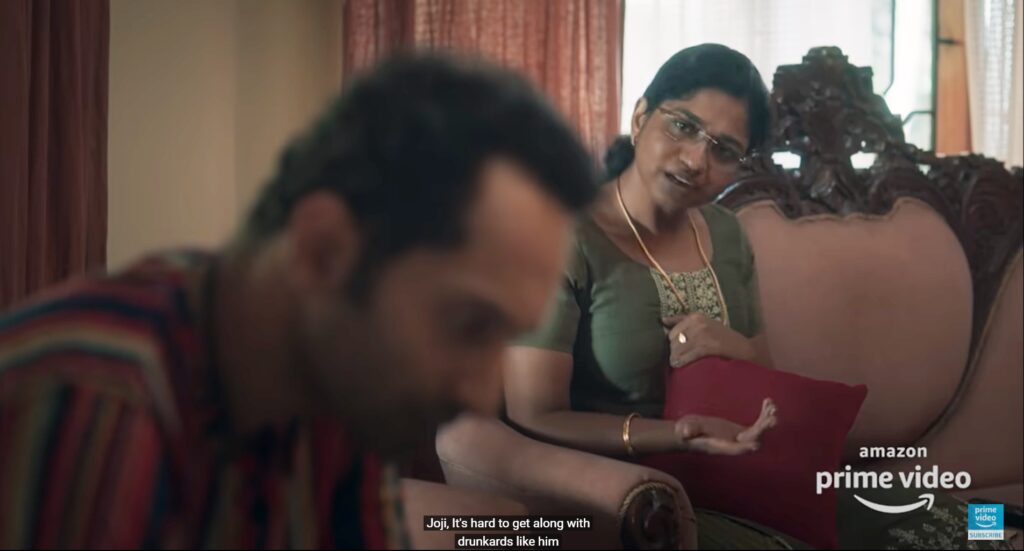Dileesh Pothan’s Joji is by no means a typical adaptation of Macbeth. Nothing about the film is textbook Macbeth-y apart from the fact that the central character is driven by his vaulting ambitions, a signature trait of Macbeth. However, I am not here to focus on Joji, portrayed menacingly by Fahadh Faasil who has been deservingly applauded well enough. I am here to talk about Bincy, the extremely subtle Lady Macbeth who does what she has to but not in the frenzied manner of the Shakespearean Lady Macbeth we are habituated to.
Lady Macbeth in Joji is an Indian housewife. She is the sister-in-law of Joji and her and Joji’s conditions are almost similar in the household. Hers is rather worse as unlike Joji, even her presence in the house is almost never acknowledged, let alone respected. The only woman in the entire household, she does all the household chores on her own and like all the other members of the family, lives under the constant fear of the King Duncan of the house, her father-in-law, Kuttappan P K Panachel.
Also read: Film Review: 22 Female Kottayam Is More Violence And Less Justice
The primary difference between the Shakespearean Lady Macbeth and Bincy in the film Joji is that the former was in a position of power and respect when she plotted the murder of Duncan. The latter, however, wishes death upon the father-in-law from a state that is not only hopeless but also devoid of any respect. Being in this position of complete powerlessness is what prevents Bincy from the spirals of extreme guilt trips that were characterised by the original Lady Macbeth. Bincy does not have enough to be grateful for and therefore the question of feeling guilty for being a silent accomplice in the murder of the King of the house does not arise.
Bincy as Lady Macbeth in Joji is extremely subtle in her acts and ambition. She is the one who first plants the seeds of independence and desire in the mind of Joji when she advises him to sell off the horse without asking for Jomon’s permission.
Bincy as Lady Macbeth in Joji is extremely subtle in her acts and ambition. She is the one who first plants the seeds of independence and desire in the mind of Joji when she advises him to sell off the horse without asking for Jomon’s permission. She simply says, as Joji is also a member of the family, he does not need to constantly seek permission from his elder brother to make decisions. Now, this advice seems almost harmless, and it is, but it does its work of influencing Joji on a path of desire of being independent and powerful enough to make his own calls. He disconnects the call even after Jomon picks it up, and sells the horse on his own. He tastes independence, and after earning money by himself for the first time finds that the only person who was by his side is Bincy.
Bincy knows that her ambitions can prove to be too dangerous if they are loud. So, she takes small, silent steps. She first sends her husband to plead with the father-in-law regarding the separation of the property but when that does not work, she snaps; tears roll down her cheeks for the first and the only time in the film Joji. And quite amusingly, it is only Joji who witnesses the change in Bincy‘s temparement as she snaps at him on being asked to give him a bottle of cold water. Her behavior surprises Joji and when he goes to talk to her, she clearly says how “their” plan of having a better life would never work and keeps that “as long as the father is alive” part self-explanatory.
It is after this encounter at the kitchen with Bincy and being reminded of how his good days will be wasted on the kitchen slab as long as the father is alive, Joji makes up his mind. He starts altering the medications of his father and who is the silent witness of the act? Bincy! When coming out of the room after changing the medications, Joji catches the reflection of Bincy in the mirror. They stare at each other for a matter of seconds, but the message has already been sent and received, and Bincy goes about her way as if nothing happened. This is the moment we realise what perfect creatures are Macbeth and Lady Macbeth in this adaptation. They are in perfect sync even without any direct communication between them regarding the murder. The image of Bincy in the mirror hanging on the opposite wall of Joji simply shows how similar they are, in character and in ambitions. It almost seems that the mirror is reflecting Joji’s inner self in the form of Bincy, who does nothing but silently supports the act without any prick of conscience.
When the King Duncan of the family finally dies, there is no visible change in the behavior of Bincy. While sitting in front of the dead body of her father-in-law, she looks at him for a while and then casually straightens out a flower of the garland put around his neck. This scene in the film Joji is powerful as it shows within a few seconds how the power dynamics have shifted and how she, with this last act of paying a reluctant respect to the dead man, will be finally able to live free from his haunting presence in the house.
Bincy never experiences guilt, not even once, even after being completely aware of how Joji was calculatively murdering his father. Even Joji dreams of his father once in a state of guilt, but Bincy, with her calm and focused mind, simply says that the dead never comes back, but one should always be aware of the living.

This is where the movie breaks free of the traditional Lady Macbeth trope. Bincy’s lack of power and respect in the household is what constitutes her cold and calm demeanour, a concrete knowledge of what she wants and never feeling guilty about it. It is only after the death of her father-in-law, we see that a maid has been appointed in the house to help her with the chores. Bincy here has been so oppressed in her role as a housewife that she simply becomes incapable of feeling guilty and going into a frenzy. She is very clear on what she wants and when she finally has it, she is far away from losing her shit as she knows this was the only way she could have gotten her legitimate position in the house.
Bincy’s lack of power and respect in the household is what constitutes her cold and calm demeanour, a concrete knowledge of what she wants and never feeling guilty about it. It is only after the death of her father-in-law, we see that a maid has been appointed in the house to help her with the chores.
Also read: Drishyam 2 Review: A Cinematic Universe Founded On Victim Blaming
Towards the ending, when Joji mentions Bincy as his silent accomplice in the murder of his father and her husband questions her, Bincy calmly says how he (Jaison, the husband) had also wanted the same thing to happen. The truth in the sentence renders the husband speechless and we know Lady Macbeth here has won. She has won a battle where she was not even considered a part of the battle field let alone be considered a warrior. But the Lady Macbeth in Joji is all iron and steel and in her act of being an accomplice in the killing of Duncan, she even surpasses Macbeth at moments and we know we have got a real hero here who understands her ambitions, believes in their validity and never once flutters in the mission.
Pramila is a post graduate in English Language and Literature who is finding her way through life with a lot of chaos but definite progress. She attempts to be a voracious reader and is a bit obsessed with the new genre of sadcom shows that are on the rise. Trying to be a better feminist everyday, she survives on books, tea, and all things blue.
Facebook handle: https://www.facebook.com/marlawayne.mia
Featured image source: Scroll.in




